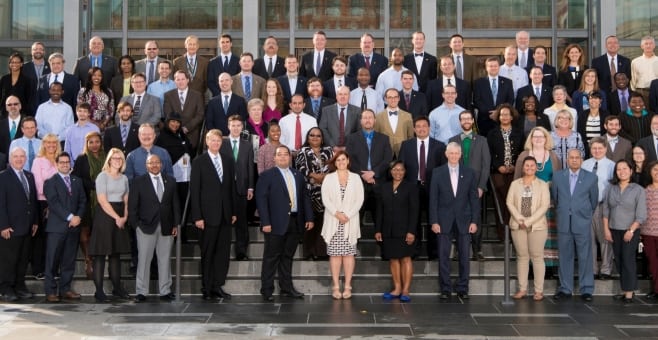
After a bombshell report that the head of the Defense Nuclear Facilities Safety Board wants Congress to dissolve the independent Department of Energy watchdog, several seasoned watchers of the weapons complex — running the gamut from former Department of Energy employees to hardcore anti-nuclear activists — said lawmakers should not eliminate the board.
“The Board has carefully nurtured its credibility over the years,” Greg Mello, executive director of the Los Alamos Study Group in New Mexico, wrote in an email to Nuclear Security & Deterrence Monitor on Thursday. “Nobody, to my knowledge, questions DNFSB’s expertise.”
Mello wrote to the Monitor the same day the Center for Public Integrity reported that Sean Sullivan, the Republican who President Donald Trump promoted to chairman of DNFSB in January, recommended that Congress eliminate the board.
A DNFSB spokesperson in Washington declined to comment on the Center for Public Integrity’s report, or confirm the authenticity of a letter Sullivan sent to White House Office of Management and Budget Director Mick Mulvaney in June.
In the letter, Sullivan called the roughly $30-million-a-year DNFSB a “relic” of the Cold War that had outlived its usefulness and could be comfortably eliminated as part of Trump’s drive to reduce the size of the federal government.
The DNFSB was established in 1989 as a health and safety ward for defense nuclear facilities. The board has no regulatory authority over DOE, but it can issue safety recommendations with which the secretary of energy by law must publicly agree or disagree. The five board members who steer the group are appointed to staggered five-year terms by the president and confirmed by the Senate. Besides its Washington-based staff, the board has resident safety inspectors at DOE defense nuclear sites including the Los Alamos National Laboratory in New Mexico, the Oak Ridge Reservation in Tennessee, the Savannah River Site in South Carolina, and the Hanford Site in Washington state.
Eliminating the board would require an act of Congress. The latest appropriations bills produced by the House and Senate for fiscal 2018 would fund the DNFSB more or less at historic levels. Spokespersons for the House and Senate Armed Services committees, which have the authority to amend the Atomic Energy Act and remove the DNFSB’s enacting statute, did not reply to requests for comment Thursday.
As an alternative to eliminating the agency, Sullivan proposed downsizing the board and moving much of its technical staff to an office within the Department of Energy (DOE). In that scenario, Sullivan said the secretary of energy would then have the leeway to eliminate that quasi-DNFSB office and move the former board staffers to other DOE positions.
The restructuring, Sullivan said, would save about $7 million a year in expenses and, crucially to the former Navy justice advocate general, sharply reduce the board’s Washington-based staff — a group Sullivan said has become “ineffective.”
A former DOE employee, who spoke under condition of anonymity, said that while the board could stand to be reformed “you should not do away with DNFSB.”
Like other federal agencies, the former DOE hand said, the DNFSB is prone to “mission creep”: government jargon for an agency attempting to expand its authority beyond its original mandate. That led to the occasional turf wars between the board and DOE at defense nuclear sites, but it did not render DNFSB redundant or even necessarily ineffective, this person said.
The head of a nongovernmental group that represents communities near DOE sites sounded a similar note.
“DNFSB at times has been seen as making certain decisions to try to stop or interfere with DOE project development due to Board member’s being against certain projects,” Seth Kirshenberg, executive director of the Washington, D.C.-based Energy Communities Alliance, wrote in a Thursday email to NS&D Monitor. “DNFSB has at times caused large project delays and costs due to DNFSB fighting with DOE instead of working with DOE offices.”
Even so, said Kirshenberg, “the complex without DNFSB would be less safe and we would likely have more incidents over time.”
The current Defense Nuclear Facilities Safety Board is split neatly along party lines. Sullivan and Vice Chairman Bruce Hamilton are Republicans. Daniel Santos, Jessie Hill Roberson, and Joyce Connery — board chair during the latter years of the Barack Obama administration — lean Democratic.
All three of the Democratic-leaning members, according to the Center for Public Integrity report, distanced themselves from Sullivan’s June recommendation to Mulvaney.
Connery, in a June letter to Sullivan also posted online this week by the Center for Public Integrity, said she “fundamentally disagreed” with his contention that the DNFSB provides minimal value to DOE.
“DNFSB provides a necessary function to ensure that Defense Nuclear Facilities are being adequately overseen by the Department of Energy and provides confidence to Congress and stakeholder communities these facilities are operating safely and that the Secretary of Energy is providing adequate protection to the public,” Connery wrote.
Santos and Roberson likewise penned letters to Sullivan in which they made clear they did not support the chairman’s proposals. Roberson — a DOE veteran who has helmed the agency’s Office of Environmental Management — repeated in her letter a claim she has made before: that the DNFSB is “overdue for strategic reforms.”
Sullivan, in his letter to Mulvaney, said he spoke only for himself, and not for his colleagues.
Staff reporter Wayne Barber contributed to this story from Washington.